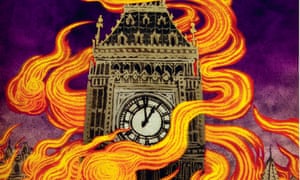via the New Statesman by Stuart Maconie
From Roxy Music to Florence and the Machine, a new book chronicles the long, fertile and symbiotic relationship Wbetween pop music and the art school

The American multimedia performance art collective the Residents in the 1970s
When John Lennon sat his O-level art exam in 1957 “there was one question which said to draw something to do with ‘travel’. I drew a picture of a hunchback covered in warts. They obviously didn’t dig that.” Unsurprisingly, he failed in every subject, including art, his favourite and best. “There was obviously only thing one for it,” writes Mike Roberts in his new book; “art school.”
Continue reading
==============================
via Boing |Boing by David Pescovitz
When I was very little, my big brother brought me in to school for show-and-tell. In the lunchroom, a kid fired a rubber band that hit me right in the face. I still remember the welt. This fascinating video uses high-speed footage to explain the physics behind this age-old form of weaponry. It also reminded me of the traumatic experience that forever made me a conscientious objector to the rubber band wars.
==============================
via About History
The future king was born on April 25, 1284, in Carnarvon Castle in north Wales. At the place of birth he is sometimes called Edward of Carnarvon. By that time, Wales was ruled by England for less than a year, and perhaps Carnarvon was deliberately chosen as the birthplace of the next royal son: it was a symbolically important place for the Welsh, associated with the history of the Roman Empire, and also the center of the new royal administration in the northern part of the region. The modern day prophet, who believed that the end of time was approaching, foretold a great future for the baby, calling it the new king Arthur, who would lead England to glory.
Continue reading
==============================
via the Guardian by Henry Eliot

A detail from the cover of MP Shiel’s The Purple Cloud. Photograph: Matthew Young/Penguin
The world’s largest library of classic literature is the Penguin Classics series, which has more than 1,200 titles in print. It features all the most famous works of world literature, from Homer’s Odyssey to Ulysses by James Joyce. But as well as its grand galleries and corridors, its illustrious authors and literary landmarks, it has plenty of secret rooms and hidden corners, filled with titles that fewer people read, and these can be just as rewarding to explore.
You might ask whether a book can justify the term “classic” if it only has a handful of readers. I believe it can. There are three essential criteria for defining a classic: it must have endured a number of years; it must have intrinsic literary quality; but, most crucially, it must still be alive, to be able to connect with readers, thrilling them with flashes of recognition and revelation. This is the brilliant paradox at the heart of a classic: it may have been written centuries ago, but its kernel of truth still feels startlingly contemporary.So it doesn’t matter how many people admire a classic; the important thing is what it can do to you. There’s even a particular pleasure when you make a literary connection and you know you’re among a limited number of initiates. “Few people love the writings of Sir Thomas Browne,” wrote Virginia Woolf, for example, about the esoteric 17th-century essayist, “but those that do are the salt of the earth.” So I recommend striking out and investigating those more shadowy shelves. What follows is a personal selection of some less well-known classics. I hope you enjoy these and that they lead you to other lesser known passages in the marvellous library of world literature.
Continue reading
I have not read any of the books on this list!
==============================
via Interesting Literature
As well as writing Treasure Island and Jekyll and Hyde, Robert Louis Stevenson (1850-94) also wrote the perennially popular A Child’s Garden of Verses (1885), a collection of poems for younger readers including this lovely poem about gazing into the reflective waters of the river. Here is ‘Looking-Glass River’, along with a few words of analysis.
Continue reading
That reminds me that I have a battered paperback copy of “A Child’s Garden of Verses” somewhere.
==============================
via the Big Think blog by Oasul Ratner
Two new papers say everything we knew about black holes was wrong.
- Scientists calculate that black holes don't have singularities at their centers.
- Instead, the theory of loop quantum gravity predicts that black holes shoot out matter across the galaxy.
- The matter dispersal comes much later in the future.
via Arts & Letters Daily: Matthew Aucoin in The New York Review of Books
Debussy: A Painter in Sound
by Stephen Walsh
Knopf, 323 pp., $28.95

Henri Manuel/Getty Images
The world of classical music loves an anniversary to celebrate the already-celebrated. The 250th anniversary of Mozart’s birth in 2006 brought performances of all twenty-two of his operas in his hometown of Salzburg, among innumerable other festivities worldwide; the 225th anniversary of his death in 2016 prompted the release of a two-hundred-CD set of his complete works. In advance of the 250th anniversary of Beethoven’s birth in 2020, the German government has declared him a “matter of national importance,” as if he were a precious, rapidly disappearing natural resource. One could be forgiven for wondering exactly why the most-performed composers in history need these promotional blitzes.
Continue reading
There’ a bit more but the whole article is behind a subscription wall.
==============================
via ResearchBuzz Firehose: West Bridgford Wire

Nottingham in 1751 - looking from West Bridgford, with Nottingham Castle to the right and St Mary’s Church to the left
A new website hosting thousands of Nottingham photographs will be launched from 1 November 2018, one hundred years after the city’s photographic collection was established.
The Picture Nottingham site at www.picturenottingham.co.uk builds on the success of its predecessor, Picture the Past, will enable visitors to view thousands of images capturing our rich social heritage ranging over 200 years.
Continue reading
==============================
via Boing Boing by David Pescovitz

Recent research suggests that our sense of smell evolved to help us find our way. Now, McGill University neuroscientist Louisa Dahmani and her colleagues support that idea, termed the "olfactory spatial hypothesis."
Continue reading
==============================
via Interesting Literature
It’s been suggested many times that there’s a fine line between the poet and the madman, and sometimes, perhaps, no line at all. And so it’s of little surprise that poets down the centuries have written so frequently about madness, mental turmoil, and other disturbed psychological states. Here’s a selection of the very best poems about madness of various kinds.
Continue reading
No comments:
Post a Comment